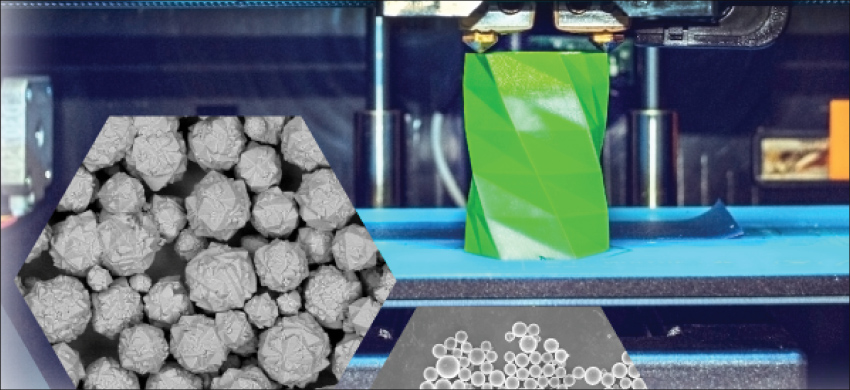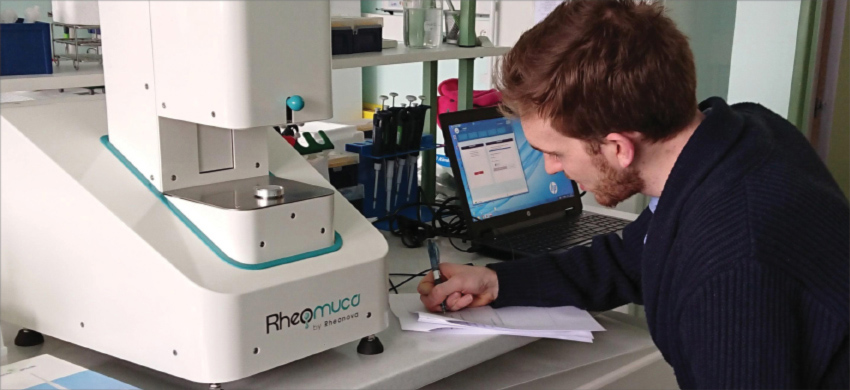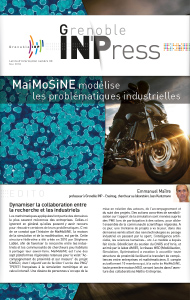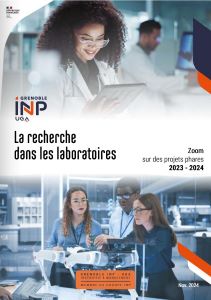Contents
 Fostering collaboration between research and industry
Fostering collaboration between research and industry

Approximately ten people work to foster relationships between the various players and support ongoing projects. Concrete actions are carried out to raise awareness among SMEs in terms of the benefits of simulation. Over 30 projects have so far been launched in a variety of fields covering everything from nanotechnology to industrial weighing, sports, artificial intelligence or human sciences.
The model has since served as an example to others. It has garnered support from the CNRS and Inria and is led by the AMIES Labex. The MSO network (modelization, simulation and optimization) aims to provide all nearby structures with support to facilitate the transfer of skills between mathematicians and businesses. It currently counts ten members. Following MaiMoSiNE, the partners launched an initiative for Math-Business collaborations.
Emmanuel Maître, professor at Grenoble INP – Ensimag, researcher at the Jean Kuntzmann laboratory (LJK)
An airbag for motorcyclists

How to automatically detect a fall just before it happens? That is the goal of the algorithm developed by LJK researchers for In&Motion, a company that is developing an airbag vest for motorcyclists.
Since 2015, athletes from the French ski cross team have been wearing smart airbag vests developed by In&Motion. Following this success, the small company wished to expand its range to offer a special solution for motorcyclists. After developing a prototype that was not reliable enough, the company called upon MaiMoSiNE to help overcome this challenge. The company’s goal is complex as the aim is to provide a vest for grand prix motorcycle racers and the vest must only engage just before a fall. It is essential that the vest not engage at the wrong moment, for example during a delicate maneuver that is on the edge of being a fall, but not yet actually a fall.
The vest relies on a sensor that measures rotation in three directions as well as acceleration across three axes. Based on these six parameters, which are measured every two milliseconds, an algorithm has to anticipate any fall. The first model was too simple and fall limits were set by hand. “The company needed more precise analysis and called on MaiMoSiNE to help it find the right skill sets to overcome this challenge. Thanks to our expertise, we fine-tuned the model until it was able to detect a fall at just the right moment. We also had to take into account the fact there’s a 50 millisecond delay for the airbag to deploy” explains Sylvain Meignen, LJK researcher.
The model was tested using datasets that recorded falls on race circuits. It detected 95% of falls within the required time. In&Motion is planning to extend this model to offer solutions for motorcyclists on roads as well as horseback riders.
Improved performance for acoustic antennas
With help from partners such as the LJK, MicroDB developed a new generation of reasonably priced, manoeuvrable and fun antennas. Their product can precisely identify, locate and measure a sound’s origin even in a complex environment.
MicroDB is specialized in the identification and analysis of sounds. The company helps solve issues in a variety of fields such as the automotive, aeronautics or marine industries. MicroDB supplies both the tools to carry out measurements and solutions to create a precise map of sounds in an environment.
The company contacted MaiMoSiNE as part of the FUI LUG2 project. The goal was to find relevant skill sets to help improve the analysis of signals recorded by their acoustical antennas. Christophe Picard, a researcher at LJK, worked on this challenge. By using software developed in collaboration with the Laboratory for Acoustic Vibrations (LVA) at INSA Lyon, his team modified the program to improve the speed of analysis. The use of an approach based on direct simulation enabled them to achieve real-time analysis results. “The goal is to successfully identify, locate and measure a source of sound in a complexe 3D environment. And we have to achieve this without excessive calculation capacities.” Once data is analyzed, the results are displayed using a graphical interface being developed at the LIG as part of the same project.
These systems could be used for a variety of industrial applications in transportation, mechanics, defense and energy. The mathematical techniques developed for the program could also be used in other fields such as seismology.
MicroDB is specialized in the identification and analysis of sounds. The company helps solve issues in a variety of fields such as the automotive, aeronautics or marine industries. MicroDB supplies both the tools to carry out measurements and solutions to create a precise map of sounds in an environment.
The company contacted MaiMoSiNE as part of the FUI LUG2 project. The goal was to find relevant skill sets to help improve the analysis of signals recorded by their acoustical antennas. Christophe Picard, a researcher at LJK, worked on this challenge. By using software developed in collaboration with the Laboratory for Acoustic Vibrations (LVA) at INSA Lyon, his team modified the program to improve the speed of analysis. The use of an approach based on direct simulation enabled them to achieve real-time analysis results. “The goal is to successfully identify, locate and measure a source of sound in a complexe 3D environment. And we have to achieve this without excessive calculation capacities.” Once data is analyzed, the results are displayed using a graphical interface being developed at the LIG as part of the same project.
These systems could be used for a variety of industrial applications in transportation, mechanics, defense and energy. The mathematical techniques developed for the program could also be used in other fields such as seismology.
Pollen Metrology: “Visualizing, measuring and understanding the invisible”

Pollen Metrology specializes in processes to accelerate the production of high performance materials. The company called up MaiMoSiNE to help create its offer and the partnership continues to this day.
Created in 2014, Pollen Metrology offers software that can collect and analyze a wide variety of data. Initially, the software was created to meet the heterogeneous systems of measure used for nanomaterials in fields such as specialty chemicals, cosmetics or IT. The technology was then expanded to be used for innovative materials in general.
Through MaiMoSiNE, Johann Foucher, the company’s founder, was able to connect with AMIES and the Jean Kuntzmann Laboratory to develop a software platform. In 2016, this partnership also helped the startup finetune its offer. “We created a platform with high performance in terms of calculations which enables it to analyze large scale data,” explains Johann Foucher. For the moment, the Isère-based company is a step ahead of its competition. “Our product can analyze and compile large sets of heterogeneous data. Our algorithme is very precise and we’re the only company worldwide to have such an offer.” With the support of Gipsa-lab researchers, the startup is preparing to move into the field of artificial intelligence.
At the end of 2017, the company raised two million euros thanks to two investment funds, XAnge and Kreaxi, as well as private and public funding. This round of fundraising will help the company continue developing business for its PlatypusTM platform in Asia and the U.S. The platform is the first smart software to control processes that help accelerate the production of high performance materials. It meets demand from industries such as semiconducteurs, energy, metalworking and pharmaceuticals, all of which require the ability to characterize nanomaterials in order to make decisions in terms of production.
Rheonova enters the healthcare market

Created by two graduates of Grenoble INP-Ense3*, Rheonova has offered services for rheology since 2014. Rheomuco, its flagship product, is a rheometer dedicated to in vitro follow up for pulmonary diseases such as Chronic Obstructive Pulmonary disease or cystic fibrosis. The product enables the early detection of irregularities that could lead to acute conditions and thereby help avoid hospitalization.
The startup called upon MaiMoSiNE to help it find the right expertise in terms of analyzing signals and translating the physical measurements of its rheometer into a format that is readable by doctors. Researchers at LJK successfully developed an algorithm to achieve this goal.
*An engineering school focused on energy, water and the environment
**Study of the deformation and flow of matter under stress
MSIAM: the first French master’s to earn an ECMI label
The MSIAM (Master of Sciences in Industrial and Applied Mathematics) was created five years ago. It’s co-delivered by Université Grenoble Alpes and Grenoble INP. The program trains approximately 60 students per year who become experts and leaders of scientific and technological projects that required mathematical modelization (both industrial and research projects).
The master’s recently earned recognition from the European Consortium for Mathematics in Industry (ECMI). As a result, Grenoble is home to France’s first “ECMI teaching center” (and the 21st such center in Europe).
Lettre papier
Grenoble IN'Press
Contact
- Vice-présidente Recherche et du Conseil Scientifique
Lorena Anghel - Vice-présidente Innovation et Relations entreprises
Gaëlle Calvary - Directeur de la DRIVE
Cédric Di Tofano Orlando
Tél. 04 76 57 43 16 - Annuaire






